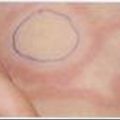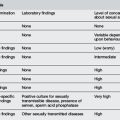11.5 Vasculitis
Classification
The primary vasculitic disorders can be divided according to the size of the vessel involved.
Small vessel vasculitis
Medium vessel vasculitis
This group includes Kawasaki disease and polyarteritis nodosa (PAN).
Kawasaki disease
Clinical presentation
 Peripheral cutaneous or perianal changes including erythema, swelling and induration. Desquamation may occur as a late sign, usually 2–3 weeks after the onset of illness, beginning in the periungal region.
Peripheral cutaneous or perianal changes including erythema, swelling and induration. Desquamation may occur as a late sign, usually 2–3 weeks after the onset of illness, beginning in the periungal region.Secondary vasculitis and vasculitis mimics
Controversies and future directions
 Aspirin, though routinely used to treat Kawasaki disease, has not been shown to reduce the risk of coronary artery aneurysm in Kawasaki disease.
Aspirin, though routinely used to treat Kawasaki disease, has not been shown to reduce the risk of coronary artery aneurysm in Kawasaki disease.Acknowledgement
The contribution of Ruth Barker as author in the first edition is hereby acknowledged.
Brogan P.A., Bose A., Burgner D., et al. Kawasaki disease: an evidence based approach to diagnosis, treatment, and proposals for future research. Arch Dis Child. 2002;86:286-290.
Dillon M.J., Ozen S. A new international classification of childhood vasculitis. Pediatr Nephrol. 2006;21:1219-1222.
Newburger J.W., Takahashi M., Gerber M.A., et al. Diagnosis, treatment, and long term management of Kawasaki disease: a statement for health professionals from the Committee on Rheumatic Fever, Endocarditis, and Kawasaki Disease, Council on Cardiovascular Disease in the Young, American Heart Association. Pediatrics. 2004;114:1708-1733. [Published correction appears in Pediatrics 2005;115:1118]
Weiss P.F., Feinstein J.A., Luan X., et al. Effects of corticosteroid on Henoch–Schönlein purpura: a systematic review. Pediatrics. 2007;120:1079-1087.










